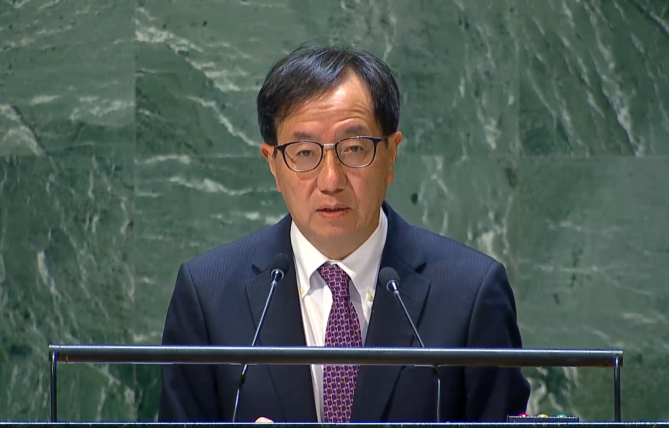Statement by H.E. Ambassador YAMAZAKI Kazuyuki, Permanent Representative of Japan to the United Nations, on behalf of the ‘Friends of the Comprehensive Nuclear-Test-Ban Treaty (CTBT)’, at the High-level plenary meeting of the General Assembly to commemorate and promote the International Day against Nuclear Tests
2024/9/4

(As delivered)
I am delivering this statement on behalf of the ‘Friends of the Comprehensive Nuclear-Test-Ban Treaty (CTBT)’: Australia, Canada, Finland, Germany, Japan and the Netherlands.
We thank the President of the General Assembly for convening this meeting.
The CTBT is a core element of the international nuclear disarmament and non-proliferation regime. The norm against nuclear testing is one of the most widely accepted and most effective contributions of the CTBT in countering nuclear proliferation, as well as in containing and reducing nuclear threats. Achieving a world free of nuclear weapons begins with an effective, universal and verifiable commitment to a world free of nuclear testing – a world where everyone can be reassured that moratoria on nuclear tests are being maintained. The CTBT’s entry into force must be achieved without further delay.
Global support for the CTBT cannot be overstated. With signature by 187 States and ratification by 178 States, the CTBT is approaching universality. We commend Equatorial Guinea, Sao Tomé and Principe, the Solomon Islands, Sri Lanka and Papua New Guinea for recently completing their ratification of the Treaty and welcome the signing by Somalia.
We applaud the persistent and impressive efforts of the Executive Secretary of the CTBTO Preparatory Commission, Dr. Robert Floyd, and his team to achieve further ratifications.
We urge all States that have not yet done so to sign and ratify the Treaty without further delay, particularly the now nine Annex 2 States. In this context, it is regrettable that Russia chose to revoke its ratification last year. We call on Russia to reverse this decision without delay and encourage all other States to re-emphasize the necessity of the Treaty’s entry into force.
The CTBT has been instrumental in creating and promoting the global norm against nuclear testing. Its verification regime has so far detected successfully every declared nuclear test.
We recall our condemnation of the six nuclear tests conducted by the DPRK since 2006, that undermine the CTBT’s objective and purpose, and strongly urge the DPRK to fully comply with all relevant United Nations Security Council resolutions, and to take concrete actions towards the complete, verifiable and irreversible dismantlement of its nuclear weapons, ballistic missile and related programmes. We reiterate that any new DPRK nuclear test would be irresponsible, unacceptable and in violation of UN Security Council resolutions. We call on the DPRK to sign and ratify the CTBT as a matter of priority.
Pending the entry into force of the Treaty, we call upon all States to declare or maintain their existing national moratoria on nuclear weapon test explosions and any other nuclear explosions, as an example of responsible international behaviour that contributes to international peace and stability, and to refrain from any action that would undermine the Treaty’s objective and purpose.
We welcome the continuous and ongoing steps and work to complete the CTBT’s verification regime. Over 90 percent of the network foreseen by the Treaty has been established. The entry into force of the CTBT would allow for the use of on-site inspections as the ultimate verification measure once the Treaty enters into force. In this context, we look forward to the Integrated Field Exercise in Sri Lanka in 2025 which will further strengthen the CTBTO’s on-site inspection capabilities.
It is worth noting that the monitoring system’s technical assets also have diverse scientific and civil applications that benefit all States, including monitoring nuclear accidents and detecting volcanic activity, earthquakes and tsunamis.
Ending nuclear testing is also vital to prevent the harmful consequences that nuclear tests could have for people and the environment. In this context, we also welcome resolution 78/240 put forward by Kazakhstan and Kiribati last year on addressing the humanitarian and environmental legacy of nuclear tests.
We recognize the importance of individual States’ financial commitments to ensure the completion and maintenance of the regime and reaffirm our commitment to support the long-term sustainability of all elements of the verification regime, pending the entry into force of the Treaty.
The CTBT’s value is unquestionable and its successes are already visible. But we cannot take for granted the global norm against nuclear testing until it is legally binding. As such, we urge all States that have not already done so to sign and ratify the Treaty and encourage States Signatories to support continued efforts to strengthen the Treaty and its verification regime, and to achieve its entry into force as soon as possible.
I thank you.
